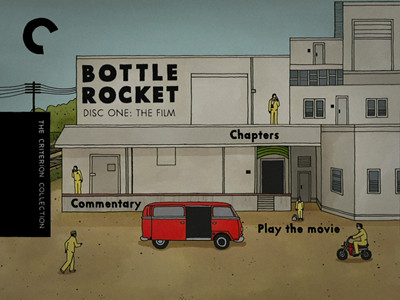
Since the Wes Anderson debate is still in full swing around the internet, I'm going to keep it going by finally taking some time with that Bottle Rocket DVD that has been sitting on my shelf unwatched. Given that my initial mission statement for this blog was to try to chronicle my personal journey through the Criterion discs, it seemed like the next logical step, particularly as something I put forward in my review of The Life Aquatic has as much application to me in this case as it does to that film's detractors. I noted that in any actual discussion with people who weren't fans of The Life Aquatic, I often found that they had only tried the movie once and could be said to hold the picture accountable for not being the other Wes Anderson movies. Both of these apply to my first reaction to Bottle Rocket; perhaps doubly so for that last part. If the Wes Anderson films that followed his 1996 debut were specialty omelets, I was dismissing Bottle Rocket for being an old fashioned plate of eggs.
I probably saw Bottle Rocket the first time in 2005 or 2006. I remembered it having come out ten years prior, and I had continued to avoid it for the same reasons I did on its first release (crap, I even remember that the movie played in Portland at the Hollywood Theatre--why do I remember that?!). When Bottle Rocket was being promoted during that run, it had the faint whiff of mid-90s Sundance, an aesthetic I had already grown weary of. It seemed like there were a lot of debut films at the time, including many post-Tarantino copycats, that relied on bungled heists by a bunch of half-witted wannabes, often made by those selfsame half-witted wannabes, and despite a personal attraction to crime films, I had begun to draw a stubborn line in the sand.
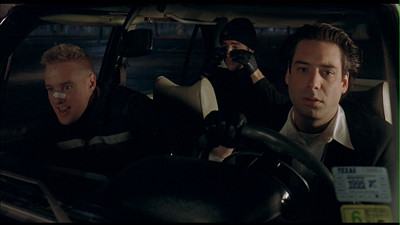
So, instead of getting in on the ground floor and following Wes Anderson piece by piece, I had essentially read the body of his book without taking the time with the developmental prologue. How could the fumbling first time ever compare to the fully realized features that followed? It's like discovering David Bowie made music prior to Space Oddity
Don't worry. I am not going to come around now and revise history and declare Bottle Rocket to be an unfairly dismissed masterpiece. I can't say that I would have been in the Anderson camp any earlier had I gotten past myself and gone to this movie in 1996. I'd probably have reviled it the way I once held Steven Soderberg's The Underneath

To begin this time around, I started with the second disc in the Criterion DVD. I figured if I was going to look at Bottle Rocket in terms of its status as one of the building blocks in Wes Anderson's self-actualization, then I should look at the building blocks of the building blocks. These include a short film from 1978 called "Murita Cycles," directed by Barry Braverman, who also put together the retrospective "making of" for this set. Braverman's film is said to have had an impact on Anderson and co-writer Owen Wilson, and it's pretty easy to see how a character like Braverman's father, who is profiled in "Murita Cycles," would have held a certain appeal for them. The old bicycle repairman who has adopted a solitary lifestyle devoted to the accumulation of junk, declaring each discard as a new treasure, not only reflects the clutter to come in the Tenenbaum house or even Steve Zissou's boat, but also the clutter of Anderson's mind. Is it a stretch to imagine the young director imagining himself in such a state in forty years time? Despite his personal attachment to the subject, Braverman also maintains a visual distance, creating a simultaneous feeling of empathy and voyeuristic pity that I think one can also find in Anderson's portrayals of his characters. They aren't just interested in the good stuff, but also in how their failings make these characters tick. (Ironic of me to note, given The Man from Porlock blog's recent essay regarding the failure of modern critics to admit a movie's failings, which includes some fair-handed criticisms of aspects of my writing style; perhaps I can learn more from Wes Anderson, after all.) Given that the elder Braverman succumbed to his more obsessive tendencies after his wife passed away definitely foreshadows how tragedy and loss would similarly affect many in the Anderson canon.
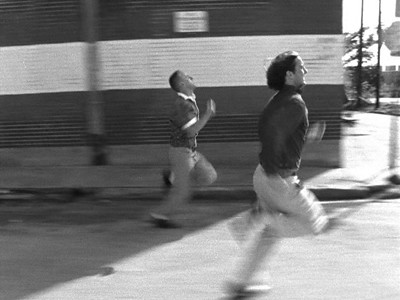
The other interesting short on DVD 2 is the original black-and-white Bottle Rocket film made in 1994, featuring many of the same actors and a lot of scenes that went on to be part of the full feature. Much is made of Martin Scorsese's passing of the torch to Anderson, and I know I've seen the full-length Bottle Rocket compared to Mean Streets
Anyway, long story not needing to be longer, these earlier pieces served as effective appetizers to get me in the mood to partake of the main course.

For those who haven't seen Bottle Rocket, the quick plot rundown: childhood pals Anthony (Luke Wilson) and Dignan (Owen Wilson) enlist their friend Bob (Robert Musgrave) in order to rob a bookstore and carry out Dignan's plan to prove themselves as a criminal crew worthy of joining the more seasoned outfit run by Dignan's former boss, Mr. Henry (James Caan). After the caper, the guys go on the lam, holing up in an out-of-the-way hotel. There, Anthony, who has just left a mental hospital where he has been rehabilitating for nervous exhaustion, falls for the immigrant hotel maid, Inez (Lumix Cavazos). This is one of many factors that leads to the dissolution of the gang and the boys going their separate ways--despite Anthony seemingly having sacrificed romance for the sake of male bonding. Eventually, they come back together after Dignan resurfaces, this time already in the employ of Mr. Henry. The old gangster is letting his neophyte underling show his stuff in a brand new heist, but as we shall soon see, the gang that couldn't shoot straight before is never going to shoot straight.
Two scenes stand out to me as fundamentally important to not just Bottle Rocket, but to all of Wes Anderson's films. The first comes at the beginning of the picture, when Anthony's doctor reminds him that he can't save everybody, seemingly a warning of how to avoid returning to the hospital. (Though, the little we learn of why Anthony committed himself doesn't really jibe with a savior complex; but whatever...) The second is the very last scene. Dignan has just been joking around in his eternally optimistic way, and then a highlighted over-the-shoulder glance suggests the joke is just a cover, that there is more going on.
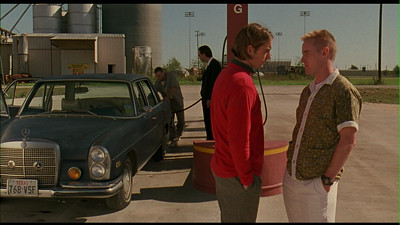
In the case of the Anthony moment, it puts what would become the reoccurring Luke Wilson character in place. In Rushmore, he plays the bit part of a doctor, a profession that is all about taking care of people. In The Royal Tenenbaums, Richie is the troubled tennis pro who eventually tries to commit suicide. Like Anthony, he has lost his ability to cope with the world, and much of his problem stems from life around him not being the way it is supposed to be. One could say that both Richie and Anthony are not caught up with saving people so much as they are with preserving a kind of purity, to stave off growing up or the loss of innocence that comes with taking one's place in the modern world. Luke Wilson's doe-eyed blankness serves these characters well; in their way, they are meant to suffer for everyone else's sins, and they live by denying their own, with only love prompting them to greater action. When Dignan first tries to get Anthony to rejoin his criminal enterprise, Anthony refuses, and he only changes his mind after Bob's older brother, the oddly nicknamed Future Man (Andrew Wilson, the eldest of the real-life brother), makes fun of Dignan. Anthony agrees in order to repair the bruised ego his friend has suffered at the bully's hands.
Dignan also serves as the prototype for what would eventually be the Owen Wilson character--the schemer whose bravado masks insecurity and hurts. Here again the casting works, because Owen Wilson is well suited to the unrelenting optimism that his characters often represent, the refusal to admit when things go wrong and the will to force it, whereas Luke's emptiness often means he is just buffeted along by outer forces. If you consider the arc of the Luke characters, Anthony is the guy who hasn't really done anything but is trying to sort out his purpose and open himself to love, the doctor is successful in his career but the verdict is still out on his personal life, and Richie has had tastes of career and romance and has lost them both. The Owen type progresses more slowly, more a variation on a theme, though his rock bottom seems to get a little harsher each time. Dignan's prison sentence, at least, is less dramatic than Eli Cash crashing his car and flying through the Tenenbaum's front window, and Francis has put himself through hell prior to the start of The Darjeeling Limited
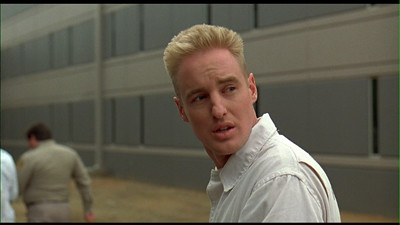
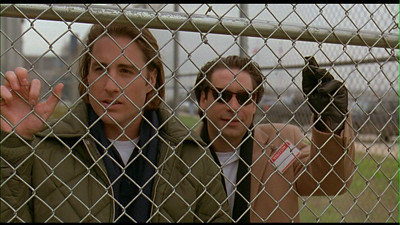
The moment at the end of the film that I mentioned is the first of what would be many similar moments in all of the Wes Anderson movies. When Dignan casts a look back at his buddies, who are on one side of the fence as he is on the other, returning to his jail cell, the look on his face says that no matter the brave smile he can put on top of the circumstances, he knows things will never be the same again. For all of his fighting to have life correspond to his childish pipe dreams, he has been forced to realize this is not possible. Consider Dignan as representative of Anderson's general Peter Pan concerns. He wants to form a gang, a version of the secret club we all have as children, complete with code names and mischief making that, despite its increased seriousness, doesn't really inspire any increased fear of the consequences. Running from the law is a game not dissimilar to the b.s. attempts most kids make at running away from home. No lesson is gleaned from the early failure. In fact, Dignan only gets more insistent, taking to wearing jump suits (a uniform or costume, of sorts) and riding a minibike (one that, tellingly, doesn't really work). Future Man's mocking of him is even for his being so childish (is he called that because he represents the crushing future that awaits anyone who can't escape assimilation?**), and Dignan's need to please Mr. Henry is the son wanting to please the father, with the father here being the most disappointing of any of the others to come.
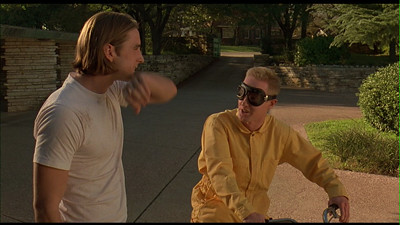
If you think I'm making a good case for these thematic elements, then thank you, you're too kind. If you think I'm maybe giving Bottle Rocket a little too much credit, then I actually agree. The ideas above are mere sketches within the film itself, and had Anderson never made another movie after Bottle Rocket, these elements of both the Anthony and Dignan character arcs would not have any real resonance. Bottle Rocket is a good movie and surprisingly easy to watch even a second time around, but it's a mere confection, the first draft of what was to come. The plot is meandering with a pretty clear division down the middle of the story. The relationship between Anthony and Inez has no real payoff. It's not an epiphany that leads him back to her, but a garbled message finally being cleared up. Mr. Henry takes Inez's place in the second half, and James Caan seems like they shipped him in from another movie, the one consolation made to make the film more appealing to distributors. I suppose if I wanted to push the notion that this is a crime movie molded into a metaphor for wanting to make movies, then Sonny Corleone's presence makes sense in terms of representing the level of craft Anderson aspires to and the blessing her yearns for the 1970s generation to bestow on him. This doesn't help Caan’s scenes to be less out of place, however, it only makes them appear more so. Just take a look at that party scene where Mr. Henry is wearing a kimono and a samurai topknot. It's a rookie cheat to make your bad guy have eccentric affectations rather than just have faith in his badness.
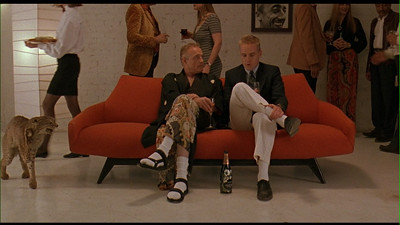
That same scene also contains a clumsily staged shot of Mr. Henry and Dignan together on a divan, being watched by a stuffed wild cat of some kind (an ocelot?). This stands as an early indication of Anderson's trademark straight-ahead framing and obsessive attention to oddball detail, but it sticks out from the rest. It's as if Young Wes Anderson peered into the future to see what Old Wes Anderson was up to and lifted a shot from himself the way he is known to lift shots from the heroes that preceded him. Accepting that and setting the snark aside, however, there are signs of the style that is developing, though it is very much in development. The use of music to drive a scene (in this case, not just Anderson's first Stones song but also an underappreciated use of two numbers by Love), long takes, Eric Anderson's art, some impressive compositions (the back-and-forth between Anthony and Dignan in the diner comes to mind)--these are all the seeds of what is to come. Some of why these seeds haven't yet blossomed comes down to budget; more real locations, less ability to falsify the environment. It's also a question of self-assurance. Though Anderson does show enough confidence to appear largely in command of his picture, he may not yet know exactly what he wants or how to get it. In the behind-the-scenes documentary, Polly Platt talks about arguing with the first-time director about having more standard cutaway shots, and when he knew how he wanted to the scene to play (not cutting away to see Dignan's POV when he discovers Bob has taken the car), he stuck to his guns; yet, many of the other anecdotes about making the movie cover the long process of first editing a way-too-long script and then editing a way-too-long movie. It was a journey worthy of the characters it portrayed, and just like Antony and the rest, Wes Anderson still had a lot of things to figure out.
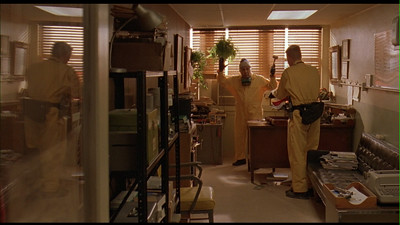
* In The Life Aquatic, Ned Plimpton is actually a lot more like the Luke Wilson role than the Owen Wilson role: a straight-shooter and a caretaker who sacrifices himself. Owen’s more assured and present acting style, as well as the accent he adopts, lends the character a different dignity, that of a Southern gentleman, than his brother might have given him.
** Actually, the name is explained in one of the deleted scenes on disc 2. Anthony says they call him that because he looks like he’s from the future, and Dignan suggests he is like some out-of-time soldier an army scientist might create for desert warfare.

2 comments:
Great article Jamie. I think it´s very interesting how looking back at a filmmaker´s early movies, in the light of his subsequent films can really make the experience much richer. I think that Bottle Rocket is a flawed but enjoyable movie and, though Wes Anderson shows promise as a young filmmaker in it, no one could have predicted the quantum leap he took from this movie to Rushmore (even if it kind of makes sense in retrospect)
I am amazed by reading this talk about movie which name is bottle rocket, and I also discover one more idea to reuse the glass bottle. Yellow Glass Bottles can be the perfect choice for you making a bottles rocket because these bottles are colored so no one can easily see the rocket inside the bottle and you can easily surprise them.
Post a Comment